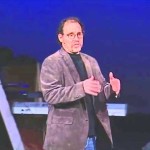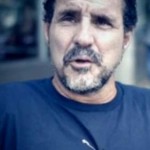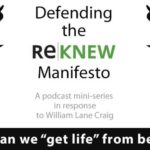We run our website the way we wished the whole internet worked: we provide high quality original content with no ads. We are funded solely by your direct support. Please consider supporting this project.

The Vicious Cycle of False Life
The serpent convinced Eve that she and Adam had been duped by God, and that God is actually unloving, untrustworthy, and threatened by what he forbids. The fullness of life they enjoyed through union with God was actually the ploy of a threatened deity that secures his position on top.
The serpent was able to seduce them into believing that there was something they could get that would improve their lot in life, something the Creator was holding back from them out of fear. This presupposed that something was lacking in their lives up to this point and that it was up to them and them alone to get it. The lie about God resulted in a lie about the source of life itself. Instead of trusting God for true life, Eve began to create an alternative reality that was centered on her own, now empty, self.
The lure of this lie brought Eve into a self-centered vicious cycle. The Enemy uses the same strategy on us today. He plants a lie in our minds that creates a vacuum in our hearts, giving the world an illusory, idolatrous appearance that confirms the lie. Out of a hunger the lie itself created, Eve suddenly saw that “the tree was good for food, and that it was a delight to the eyes, and that the tree was to be desired to make one wise” (Gen 3:6). Her perception of the tree as “desired to make one wise” confirmed that she needed something to be full.
She never would have even considered the idea of disobeying God if she hadn’t already believed the lie that she was deficient.
This vicious cycle is repeated in every lie we believe that underlies every sin we commit. And it is this cycle that keeps our empty selves in the center of our world rather than the fullness of God. Believing a lie, we judge God to be untrustworthy or inadequate to fill us with true life. These lies about God then block God’s fullness and makes us feel empty and on our own.
Our emptiness in turn makes other things seem like viable candidates to fill us. Things like religion, sexual pleasure, fame, riches, and power take on an illusory god-like attractiveness to us when viewed with the hungry eyes of our vacuous souls. Because of the power of the lie, the idols can create a momentary sense of fullness, life, and worth. But this sense of fullness is never truly satisfying or permanent. What results is the perpetuation of the cycle, which will repeat itself until the lie about God and the lie about the source of our life is broken. Only then will our hearts be free from this all-consuming cycle.
—Adapted from Repenting of Religion, pages 144-146
(image: Girl at Table, Oleksandr Murashko, 1910)
Category: General
Tags: Lies, Lies Truth, Life in Christ, Life to the Full
Related Reading

Sermon: Reframing the Sun
In our clip from this weeks sermon, Greg Boyd talks about how we respond to misfortunes and tragedies depends on how we frame them. In Colossians 3, Paul writes that Christ is all and is in all. When we frame our life within this understanding, we begin to see how we can live through misfortunes…

No More Hungry Hearts
When Jesus came, he confronted the lie that we can fill our hungry hearts through doing things to acquire life on our own. The fact that God himself became a human and died for our sin reveals that we do not have the ability to satiate our hunger. If we had the ability, it wouldn’t…

Life to the Full
What does it mean to live life to the full? Greg addresses this question in this short video by The Work of the People.

Are You Fully Alive? Here’s the Key
Image by rashdada via flickr. The cross reveals the full truth about us. This truth reconnects us with our true source of life, which in turn heals our idol addictions. This dimension of the cross is frankly so breathtakingly beautiful that, so far as I can tell, very few followers of Jesus have ever really grasped it.…

Trying to Acquire What You Already Have
Image by Joshua Earle The lies Satan told to Eve in the garden made eating from the forbidden tree (the Tree of Knowledge of Good and Evil) look desirable. On the one hand, the lies caused her to question God’s trustworthiness. And correspondingly, on the other hand, they also caused her to question whether it is…

Podcast: Defending the Manifesto (3 of 10)
Greg responds to challenges by William Lane Craig from Craig’s podcast “Reasonable Faith.“ In this episode Greg discusses getting life from Christ and not from “being right” about Christ. http://traffic.libsyn.com/askgregboyd/Episode_0058.mp3
